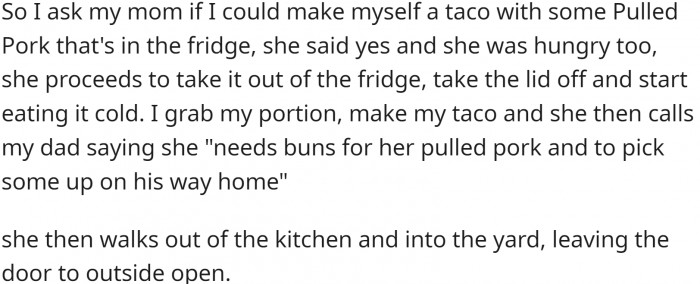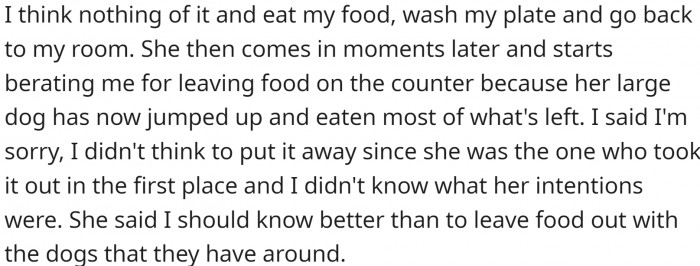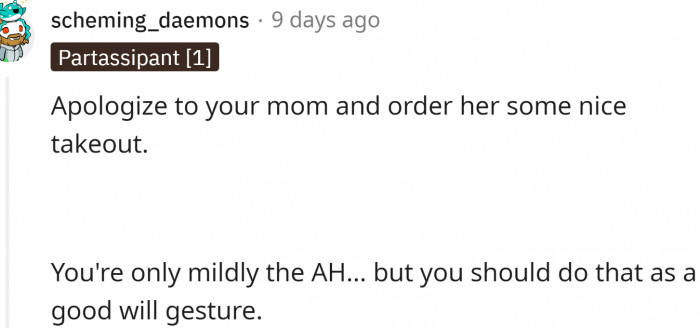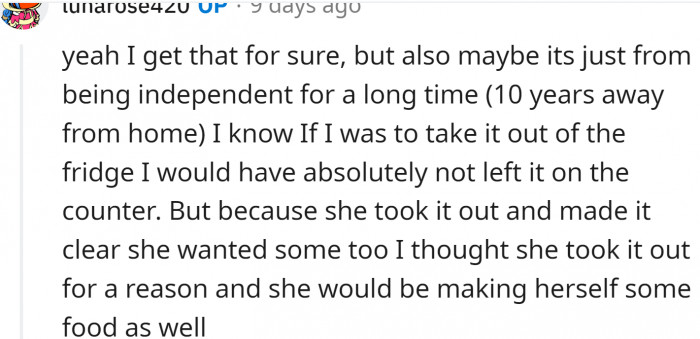Food Left On The Counter Results In A Family Dispute And One Very Happy Dog
Moving in with your parents after spending some time living independently can be challenging. Even if you were raised in a loving family and appreciated how things worked when you were there, you adopt different habits while living alone.
Then you return to your parents' house, and everything feels strange, even though it seemed great a couple of years ago. However, it is wonderful to have someone to lean on, so let’s not be too judgmental here.
Many young people temporarily move in with their parents to save money for a house down payment or while their homes are being renovated. It is great to have that kind of support.
However, problems can arise from time to time, simply because young people have developed their own habits while living independently. One such small family dispute made it to Reddit.
OP is a young woman who moved back in with her parents temporarily while she waits for her new place to open next month. She cleans up, helps with chores, and pitches in on some groceries and bills.
OP says: “I asked my mom if I could make myself a taco with some pulled pork that's in the fridge. She said yes and mentioned she was hungry too. She proceeded to take it out of the fridge, remove the lid, and start eating it cold.
I grabbed my portion and made my taco, and then she called my dad, saying she 'needs buns for her pulled pork and to pick some up on his way home.' She then walked out of the kitchen and into the yard, leaving the door to the outside open.”
Some time later, her mom came into her room and berated her for leaving the food on the counter. It turned out that the dog got to it.
Read the full story below:
OP asks:

OP is a young woman who temporarily moved back in with her parents. She helps with the chores and pays some bills.

OP took out some pork from the fridge to make a taco, and her mom wanted one too.

The Psychological Implications of Pet Behavior
This situation highlights the important link between human behavior and animal behavior, particularly in the context of neglect.
Research in animal behavior psychology indicates that untrained pets often act out due to a lack of proper guidance and boundaries.
In this case, the family dispute over food left on the counter reflects a deeper concern about responsibility and the management of pet behavior.
Her mom left the kitchen, and OP figured she would come back, so she left the meat on the counter.

Some time later, her mom came into her room and berated her for leaving the food on the counter. It turned out that the dog got to it.

Redditors mostly think that OP was right here. She didn't know if the dog was trained or not.

Understanding the concept of operant conditioning can shed light on how these behaviors develop.
Studies show that positive reinforcement training can significantly alter a pet's behavior, promoting desirable actions while reducing negative ones.
In this context, the dog’s behavior may be a result of inconsistent training or unclear boundaries, prompting the need for a more structured approach.
Dogs get into things. Some nice takeout should smooth things over.

"The dog won."

Everyone has different standards...

Practical Strategies for Managing Pet Behavior
To address these behavioral issues, establishing clear household rules regarding pet management is essential.
Research suggests that creating a consistent routine for pets can enhance their behavior and reduce incidents of mischief.
Additionally, engaging in training sessions together as a family can promote unity and shared responsibility, ultimately leading to a happier home environment.
OP should make the gesture, even though it is not her fault.

OP replied:

She also gave further explanations, and they make sense:

Moreover, educating all family members about the importance of positive reinforcement can create a more cohesive approach to pet training.
Workshops or online resources can empower families to manage their pets effectively, fostering a sense of teamwork while enhancing the well-being of all involved.
Ultimately, addressing pet behavior collaboratively can lead to a more harmonious family dynamic.
Dog owners should train their pets not to go after food left around the house. It is not sanitary for dogs to get on the kitchen counter and bite or lick food intended for humans. As for OP, she is clearly not at fault here because she is not used to living with dogs, and the thought of the dog stealing food off the counter simply didn’t cross her mind.
Psychological Analysis
The situation described in the article highlights the common challenges that arise when the habits of different households clash, especially when moving back in with parents as an adult. The misunderstanding about the dog's behavior suggests a need for clear communication and shared expectations, particularly around the management of pets. It's a great example of how our habits and assumptions can cause friction, especially in a shared living situation.
Analysis generated by AI
Analysis & Alternative Approaches
Effectively managing pet behavior requires clear communication and shared responsibilities within the family.
By fostering a supportive environment and prioritizing training, families can navigate challenges while enhancing their emotional well-being.



